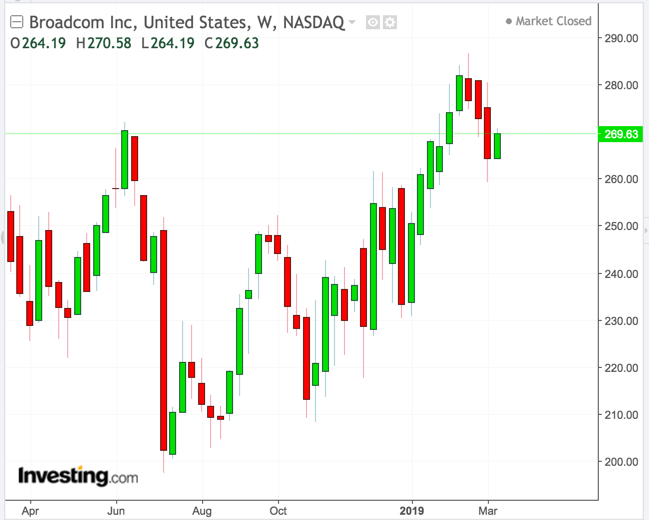- Reports Q1 2019 results on Thursday, March 14 after the market close
- Revenue expectation: $5.83 billion
- EPS expectation: $5.23
It’s not a good time to get bullish about the semiconductor industry. The demand for chips that are used in smartphones, gaming hardware, and cryptocurrencies is drying up and investors have dumped shares of some of the largest producers including former high-flyers Nvidia (NASDAQ:NVDA) and Advanced Micro Devices (NASDAQ:AMD).
In this environment of uncertainty, the first-quarter earnings of Broadcom (NASDAQ:AVGO), the last major chipmaker to report in the current earnings cycle, is likely to provide some fresh air. One factor which is helping the San Jose, California-based Broadcom is its better product mix and lower operating expenses.
Chipmakers got a big jolt in January when Apple (NASDAQ:AAPL) cut its iPhone sales forecast for 2019 in early January, citing a sharp slowdown in China. That gloomy prediction from the world’s largest smartphone maker also clouded the future of many chipmakers who supply a lot of parts to the mobile-phone industry.
But Broadcom seems to be in a good position to weather this downturn after its $19-billion acquisition of CA Technologies last year. The deal, which the market didn’t like initially, is separating Broadcom from rest of the crowd, and providing its revenue base with a nice diversification.
Its shares, which closed yesterday at $269.63, are up 16% in the last six months, outperforming the Semiconductor Index, which only gained around 9% in the same period. According to Broadcom chief executive, Hock Tan, after the CA acquisition, the company is in a better position than any of its peers to sustain a slowdown.

CA's customer base includes “virtually all of the world’s largest enterprises,” he says, adding these companies spend billions on their IT infrastructure, opening up new opportunities for Broadcom to sell its chip products.
According to a Bank of America Merrill Lynch research note, cited by Bloomberg in January, Broadcom’s dependence on Apple has shrunk to about 15-20%, down from 25%. Analysts led by Vivek Arya wrote that more than 80% of Broadcom’s sales are now derived from “more stable, sustainable enterprise, cloud, networking, software [and] storage segments.”
Investors will be looking to find the evidence of this strength tomorrow when Broadcom reports Q1 earnings. On average, analysts expect Broadcom to report $5.23 a share profit, up from $5.12 a year ago. Sales are likely to gain 9% to $5.83 billion.
For the full year, Broadcom is expected to report adjusted earnings per share of $23.04, up from estimates of about $21.50 in October, and actual earnings of $20.82 in fiscal 2018.
After sustaining the selling pressure that sent the share prices of many top chipmakers tumbling in 2018, Broadcom has proved its business model is much stronger and the company more well-positioned to handle this downturn.
Bottom Line
With the forward price-to-earnings multiple of little over 10 and with an annual dividend yield of about 4%, we see Broadcom as a much better bet for long-term investors who want to take some exposure in the semiconductor industry. This stock may underperform in 2019 as many of its peers rebound from the rock-bottom prices, but for buy-and-hold investors, Broadcom offers a better risk/reward proposition after its CA acquisition.
